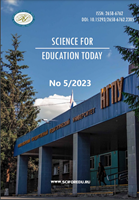Сравнительно-сопоставительный анализ моделей цифровых компетенций педагогов в условиях цифровой трансформации образования
Comparative analysis of models of educators’ digital competencies in the context of digital transformation of education
Author(s): Vera Ivanovna Toktarova, Olga Vasiljevna Rebko, Dina AlekseevnaDina Alekseevna SemenovaSubject(s): Methodology and research technology, ICT Information and Communications Technologies, Sociology of Education, Distance learning / e-learning
Published by: Новосибирский государственный педагогический университет
Keywords: Competency; Digital competencies of educators; Educators; Models of digital competences; Competence; Digital transformation of education; Digital literacy; Digital culture; Digitalization of education
Summary/Abstract: Introduction. The article focuses on analysis and evaluation of digital competence of academic staff in higher education institutions. The authors draw attention to the fact that in the conditions of digital transformation of education, the issue of educator’s competencies is becoming increasingly acute. However, currently there are no uniform standards of digital competencies, as well as their uniform definition. This determines certain difficulties in updating initial teacher education and professional development programs for educators. The purpose of this article is to identify the specifics of teachers’ digital competencies models and to illustrate their implementation in the educational practice of higher education institutions in the context of digital transformation of education. Materials and Methods. The research is based on the provisions of competence, system, activity and environmental approaches. In order to achieve the research goal, the authors used a set of theoretical (structural-functional and content analysis, synthesis, generalization), empirical (questionnaire, survey, conversation, ranking, expert evaluation) and mathematical (mathematical statistics, mathematical modeling) methods. As part of the study, the empirical data were analyzed and summarized. The sample consisted of 573 students pursuing their degrees in the field of Education at Mari State University. In order to confirm the reliability and significance of the presented statistical data, the Pearson criterion χ2 was applied. Results. Based on the analysis of theoretical research and educational practices, the authors analyzed the concept of ‘digital competencies’. The results of a comparative analysis of five models of digital competencies for educators (DigCompEdu, TPACK, SAMR, TDC and INTEF) are presented and described. The authors identify the common components for the above-mentioned models. They include technological, educational, cognitive, communicative, and personal ones. Their characteristics and interrelation are considered. The authors provide data from a survey of education students at Mari State University and identify the degree of formation and development of competencies within the identified components of the generalized model. The conditions for the integration of the five-component structure of the digital competencies model into the initial teacher education are clarified using the example of the master's degree program in Digital Pedagogy within the field of Education (44.04.01). Conclusions. Based on the data obtained, the authors identify features and specifics of implementing the models of educators’ digital competencies. They include the common core of five components within competencies and the need for their harmonious development among modern educators. The interdisciplinary nature of their formation and development in the conditions of digital transformation of education is emphasized, which is illustrated using the example of the master’s program in Digital pedagogy.
Journal: Science for Education Today
- Issue Year: 13/2023
- Issue No: 5
- Page Range: 79-104
- Page Count: 26
- Language: Russian

